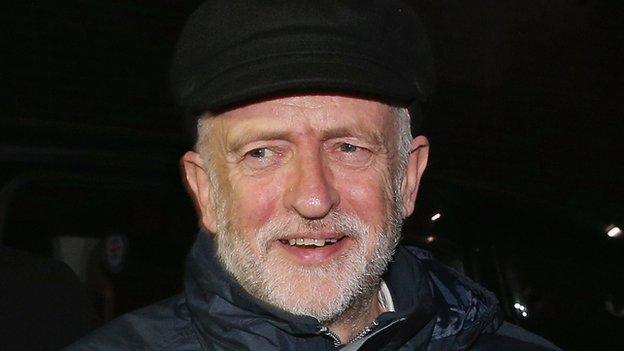Politics past, present and spectres yet to come
- Published
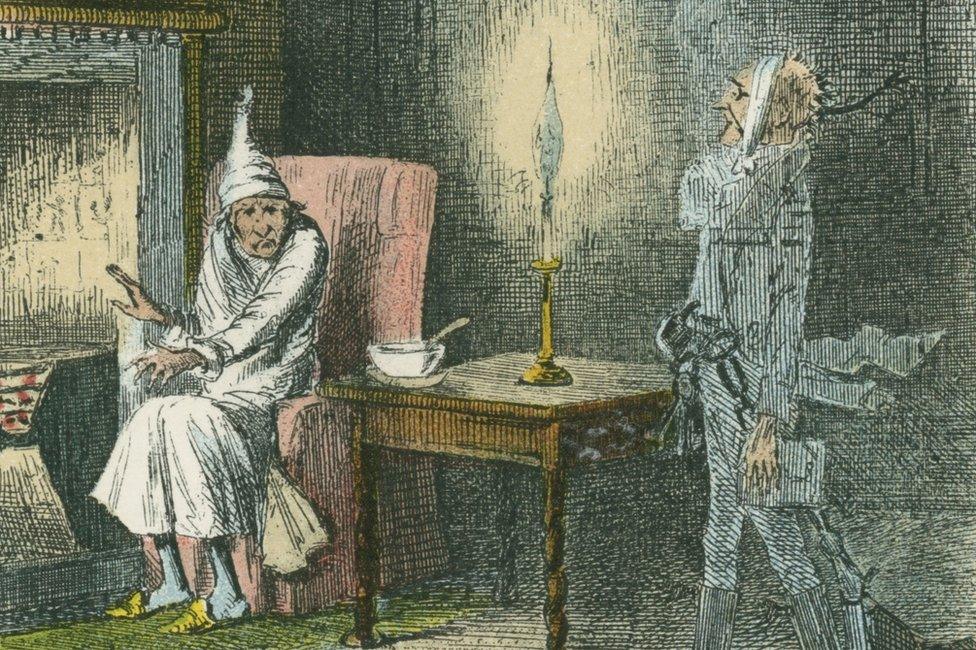
The political year has been full of tales of the unexpected, external. So this is my Christmas ghost story, of politics past, present and spectres yet to come.
Here we should pause. Pundits and commentators should be haunted by their own failures, external to predict the most significant events of the year, and I at least acknowledge that our crystal balls were cracked and misty, and must be distrusted.
Perhaps they should be packed away in a box, and we should think outside it. In that spirit I will offer options, rather than predictions.
Christmas ghost stories are best enjoyed by the well-fed and unthreatened, nestling comfortably by a crackling fire.
Among these cosy folk are the SNP, external. It has been an amazing year for this party, which managed to mingle insurgency and government.
It is totally dominant in Scotland after a landslide election victory, confident in its opposition in Westminster and likely to maintain dominance in the next Scottish elections.
But it is the Conservatives who can afford to be really smug, although there are ghosts that should scare them too.
Apparition of Blair
To go from the dominant party in a coalition to the government, sole and majestically alone, was a surprise, even for them. We should have remembered hung parliaments are a mathematical quirk.
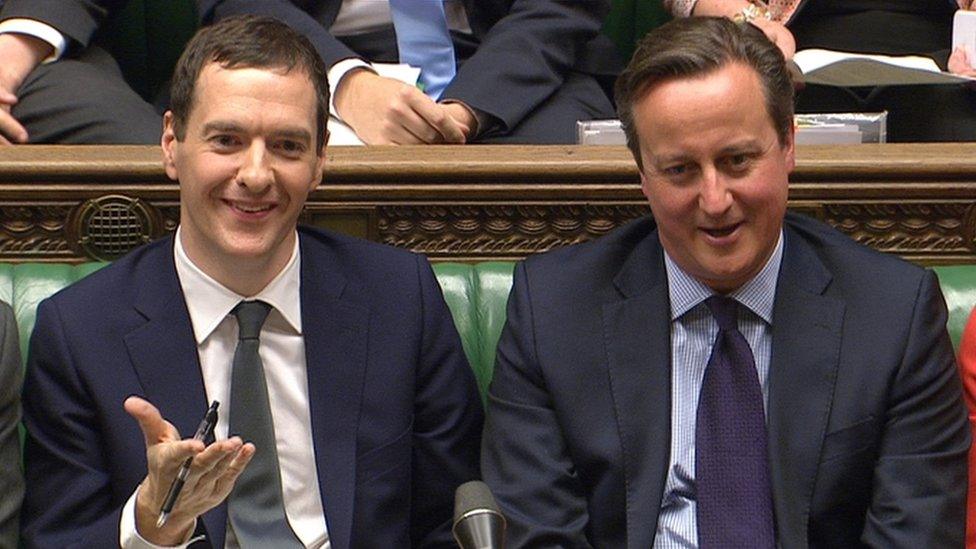
The Conservatives can afford to be smug now - but for how long?
They will not be worried by the smiling apparition around the edges of their victory - a ghostly outline of Tony Blair, centrist, triangulator, arms stretched beyond his party's earthly bonds.
David Cameron and his strategic brain, George Osborne, are students of Mr Blair's victories. If anything they have stressed a middle road between economic caution and reward for "hard-working people" more since the election than during it.
Whether or not they are really of the centre or use it as a cloak for other ambitions is not so much irrelevant as a reflection of their true devotion to their opaque master.
The weight of their victory is not just to be measured in their tiny 12-seat majority but in the scale of their opponents' defeat.
The UKIP surge - predicted all year - failed to yield one single new MP. The Lib Dems have fallen so far that they are more like "a few friends round for drinks" than an actual party. With the same number of MPs as the DUP, they are noticed about as often.
But it is Labour that jibbers and shrieks, scared witless by the clanking chains of Blair's legacy. Its defeat is a deadly admixture of reaction to his dominance for so long and the determination of some in the party to reject all he stood for.

Tony Blair's legacy has affected both Labour and the Conservatives
Wiped out in Scotland, failing to make any inroads anywhere, the Blairites were confident in defeat they would take the party back. Instead, in part because of an act of generosity, external, they are led by a man many of the MPs cannot stand, Jeremy Corbyn.
He had long been regarded by the Labour right as a throwback, an irrelevant remnant. In office, their contempt has been magnified a thousandfold.
They despise him for a lack of professional polish as well as policies they find abhorrent. They think their party has been taken over by Trots and Tankies, external.
'Loony left' or authentic politics?
It is analysis shared by most of Westminster, journalists and politicians alike.
We should, however, be aware of past failures and show a due modesty. Those of us who thought that a mood of discontent with mainstream politics could lead to a surge in support for UKIP were wrong.
But it is very possible the same mood, although not the same people, led to Mr Corbyn's victory. It is hard to believe there are that many entryist Marxists to transform a party, external.
There are competing narratives - that of most newspapers and the majority of Labour MPs is basically the old one of a "loony left" offering policies so bizarre the electorate will reject them.
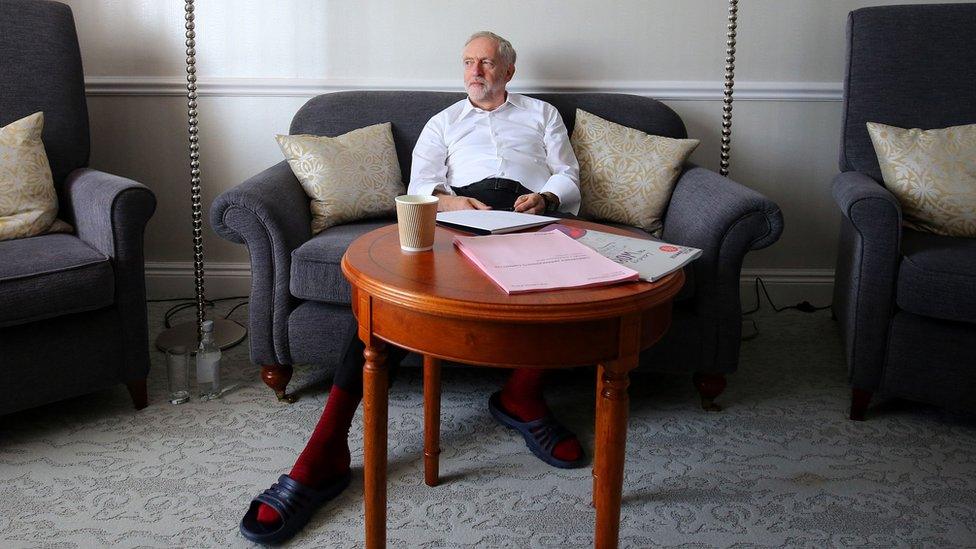
Jeremy Corbyn doesn't dress like a typical politician
That may be so. But unfashionable, dogged, radical, unflashy Mr Corbyn and his policies may appeal to more voters than are dreamt of in their philosophy.
For the Labour right it is unfortunate that they choose to display their discontent on an issue where Mr Blair's chains clank the loudest - war. Their enthusiasm for air strikes in Syria, seen as sensible, noble and patriotic by the Westminster watchers, will not be so perceived among many Labour sympathisers.
The next clash, over Trident, will underline the same divide.
Coup round the corner?
Either way the crunch will come in May. The elections in Scotland, Wales, London and many local authorities may be pivotal.
If Labour does badly it will almost certainly trigger a coup against Mr Corbyn. But the results would have to be very poor indeed to get all those new members to change their minds, so it will be a damaging fight.
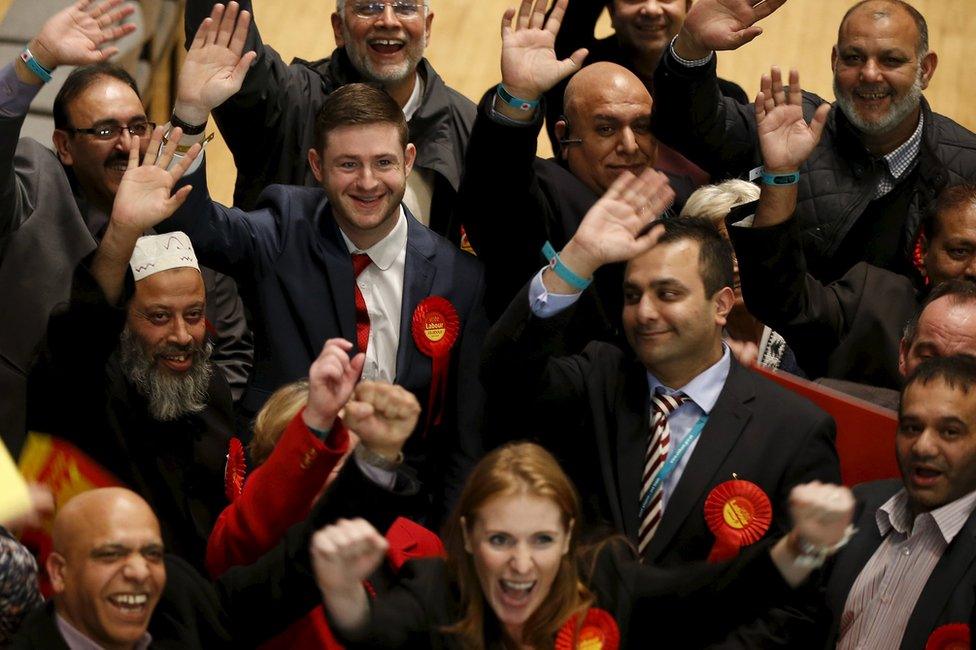
Jeremy Corbyn passed his first electoral test when Labour's Jim McMahon won the Oldham West and Royton by-election at the beginning of December
If the elections go reasonably well it will drive the Labour right into deeper despair. Splits rarely happen in British politics, but a sundering of Labour will at least be talked about in earnest.
Both sides are potentially tragically misreading the new membership and the potential they offer for a centre-left party. Many of those who ran Labour for years are convinced the new members are a reflection of the new leadership - hardline Marxists.
It is possible, however, that they are people, disillusioned by the Iraq war, confirmed anti-Conservatives, dismayed by Westminster politics, inclined towards radicalism but not strictly ideological.
The test for the left and right of Labour would be to forge this into an electoral weapon. Remember Greece? Syriza was a party composed of the odds and ends of the hard left, but supported by a large number of voters.
But the Labour Party will be too busy fighting a civil war to think about the voters.
Those May elections will be a test for the Lib Dems and UKIP too. Both have to show they can recover some strength.
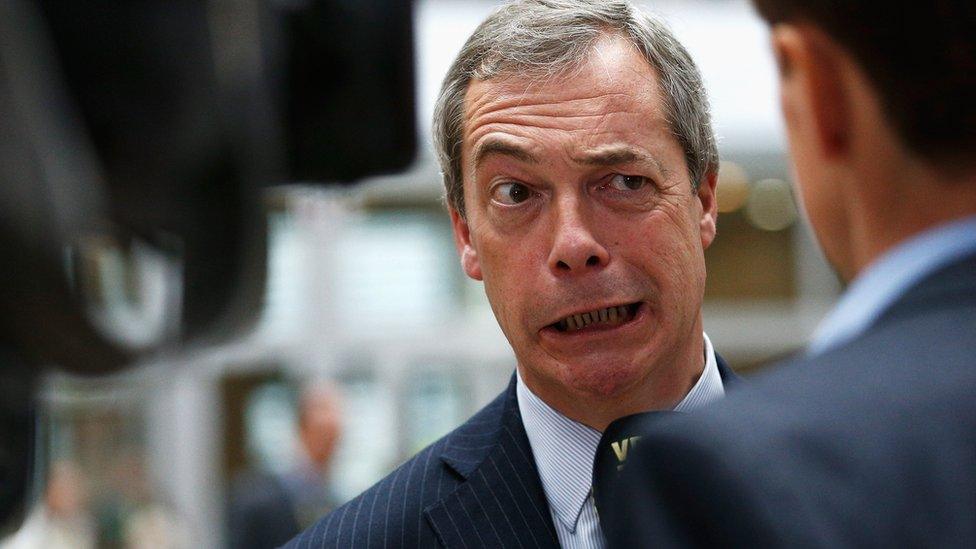
UKIP's one MP has called for Nigel Farage to resign
It is a particular challenge for UKIP. While many Labour MPs wish their leader would go, UKIP's entire parliamentary party is opposed to Nigel Farage. Granted, the entire parliamentary party is composed of one man.
That just makes it more piquant. It is a real debate over what sort of party UKIP is. The MP, Douglas Carswell, wants the party to be sunnier, less reliant on frightening people, more confidently economically liberal, not proto-protectionist.
Reality of Brexit
The rattling and moaning will grow louder later in the year - this time the ghost is that of Lady Thatcher.
Ever since her fatal fight with Geoffrey Howe and Nigel Lawson, her party has been riven by the argument about the European Union. It is that argument, in part, that has given the whole country the biggest choice it has for decades - whether to stay in or leave the EU.
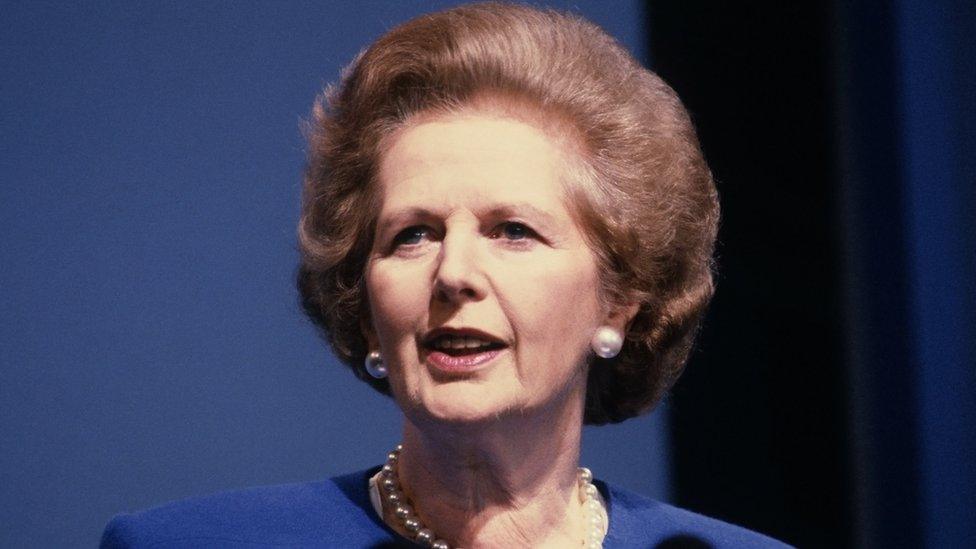
Margaret Thatcher clashed with both her chancellor and foreign secretary over Europe
This is a second test for UKIP.
If Britain votes to leave, its raison d'etre (if a French phrase is allowed here) will have been achieved, and so the party may have no purpose left in life.
If we vote to stay, it becomes a disgruntled and defeated rump. This doesn't have to be the case. In defeat, an SNP-like resurgence in the face of almost victory is possible.
It is less likely that we will see UKIP paving the way to a new dawn outside the EU - people would be more likely to cling to parties they know in the face of an uncertainty - but it is possible.
But it is the Conservatives who are haunted by the choice. Their civil war is long over - the whole party now is contemptuous of the European Union.
The division is between those who want to stay, despite themselves, and those out-and-out "outers".
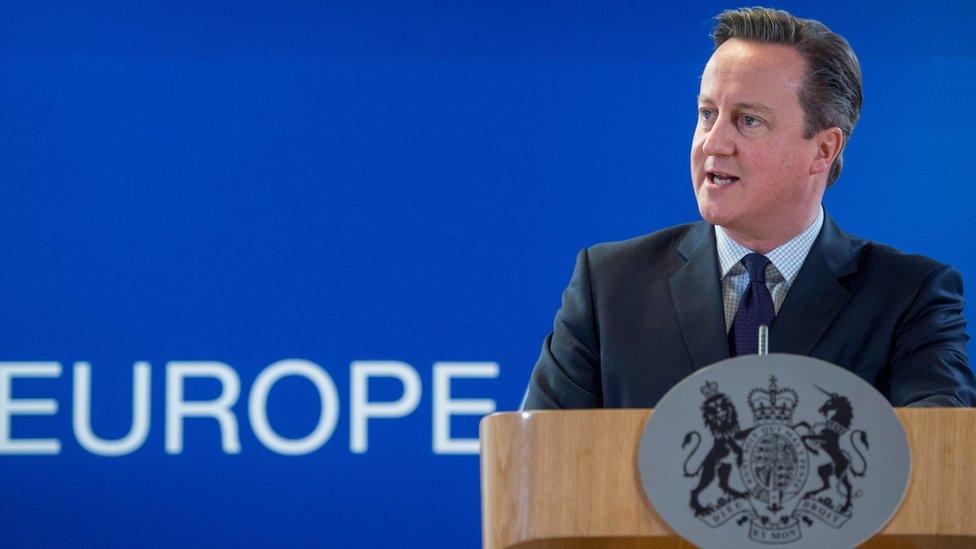
The results of the EU referendum will define Mr Cameron's legacy
A victory will leave the party and Mr Cameron (and thus his chancellor) even more secure and confident in power, although the battle may leave scars and wounds, and a bitter taste in the mouths of their internal opponents.
A defeat would mean both would almost certainly have to resign. We would then be in very choppy waters - not fatal for the Conservatives as a party, for one of the top figures, Boris or Theresa May perhaps, would take over. But some would demand a general election.
The reality of Brexit would be challenging and uncharted. The Conservatives, currently masters of all they survey, just might be looking out at a scene of devastation this time next year.
Comfortable by the fire at Christmas, they should at least allow a small shiver to run down their spine.

UK's EU referendum in-depth
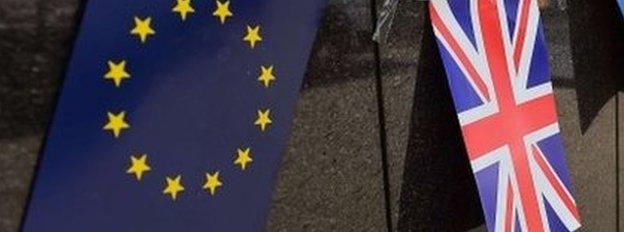

- Published21 December 2015
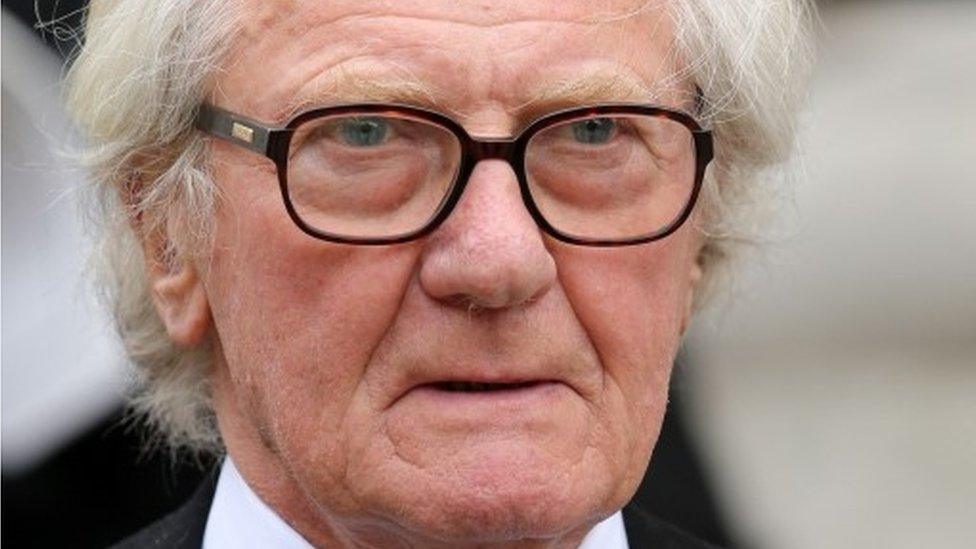
- Published18 December 2015
